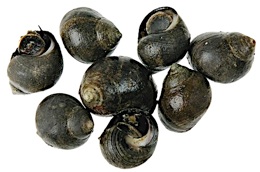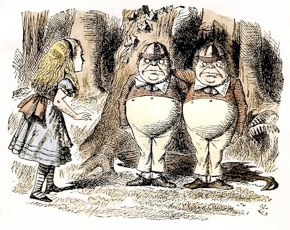The Rivals
(A Tale of the Smart Set)
At the epoch which I write of quite the smartest men in town
Were Marmaduke de Courcy and Adolphus Brummel-Brown;
They led the trend of fashion in the very highest set,
They were recognised authorities on form and etiquette.
If Marmaduke appeared in mauve, or didn't part his hair,
Then parted locks were obsolete and mauve the only wear.
And did Adolphus don pink socks to gratify a whim,
Then everybody did the same. They always followed him.
Now, before this story opened, Mr Brummel-Brown had wooed
The lovely daughter of an Earl, the Lady Ermyntrude.
She'd accepted his proposal when upon his knees he fell.
But he didn't know de Courcy was in love with her as well.
And Marmaduke turned pale with rage; his silky locks he tore;
Regardless of his trousers' crease, he writhed upon the floor.
"A murrain on the dastard knave!" he muttered (which was rude).
"By Jove, I'll cut the rotter out, and win my Ermyntrude!'"
For many weeks he worked amain, but worked without success.
He got up several epigrams, displayed his taste in dress;
He let her win from him at Bridge, though skilful in the art;
But he only lost his money, and he couldn't win her heart.
Then all at once a bright idea across his mind there shone:
"In every fellow's cupboard stands at least one skeleton.
I'll put detectives on to him – for I have ample means –
And when they've caught him out, gadzooks! won't I just give him beans!"
He summoned private sleuth-hounds, and he put them on the trail.
He bade them watch Adolphus, and he urged them not to fail,
To spare no pains in finding out how Brummel-Brown had sinned.
The youngest sleuth-hound tapped his nose, the oldest sleuth-hound grinned.
He waited for a week or so. They came with their report.
"We've got him, sir!" the sleuth-hound said. "To put the story short,
This very morning, sir," they said, "we copped the cove a treat.
He was eating hot potatoes from a barrow in the street!"
(Alas! the charge was but too true. Though free from other sins,
He always had a passion for potatoes in their skins.
He knew the taste was low and vile – in short, a social crime,
But he couldn't check the craving, and he yielded every time.)
The news delighted Marmaduke; he bounded in his glee.
He pressed into their itching palms four times their proper fee;
His eyes lit up with fell resolve; his heart with triumph stirred.
He called upon Adolphus, and he told him what he'd heard.
"If this should get about, my lad, you'd look a little blue;
Society would cut you dead – that's what they'd do to you.
But still I'll give you just one chance, and only one. Now, mark!
Give up the Lady Ermyntrude, and I will keep this dark."
Adolphus writhed, Adolphus raved, Adolphus had a fit,
But not a way could he discern of wriggling out of it.
He wrote a note to Ermyntrude to say farewell for aye,
And she got it by the early post upon the ensuing day.
But mark the sequel! Brummel-Brown, distraught, with riven heart,
Grew pale and melancholy, and preferred to mope apart.
And to dispel that leaden grief, which grips the soul and numbs,
He took to feverish midnight walks about the lower slums.
One night as he was roaming on his self-appointed beat,
He spied a furtive figure at a barrow in the street.
And his haggard face next moment was divided by a grin:
It was Marmaduke de Courcy – eating winkles with a pin!
The rest does not take long to tell. The reunited pair
Were married three weeks later at St Peter's, Eaton Square.
The presents were both numerous and costly, so they say,
And the bride looked very handsome, so declared the Press next day.
And as for wicked Marmaduke, he met a fitting fate.
He found it best to pack his boxes up and emigrate,
And, according to the rumours, is at present big-game shooting
In the unexplored and trackless wastes of Penge or Upper Tooting.
First published in Novel Magazine, August, 1905.
Note:
-
-Murrain: a plague
-
-Winkle: periwinkle or littorina littorea, a small marine mollusc.

-
-Penge: from 1885 the hamlet of Penge was a ward of the Dulwich constituency, with many Victorian almshouses.




